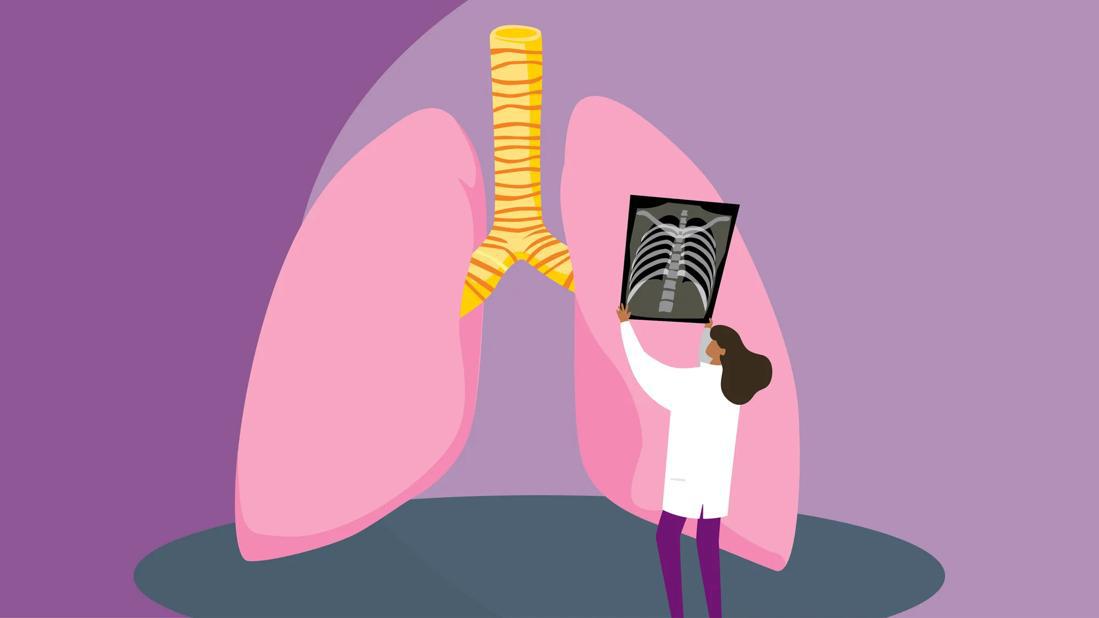What’s the Difference Between Bronchitis and Pneumonia?
Both are respiratory infections, but bronchitis affects your bronchial tubes, while pneumonia affects the air sacs in your lungs

Upper airway infections like a cold can leave your lower airways more vulnerable to viruses and bacteria, and that’s when bronchitis or pneumonia can strike. These respiratory infections share many similarities, yet they affect different parts of your respiratory system in different ways.
Pulmonologist Leslie Tolle, MD, explains how bronchitis differs from pneumonia and when you should seek treatment.
How do you tell if it’s bronchitis or pneumonia?
On the surface, it can be hard to tell the difference between bronchitis and pneumonia. The largest difference is where these infections occur:
- Bronchitis infects your bronchial tubes, or the airways that run from your windpipe to your lungs. It can be bacterial or viral.
- Pneumonia infects your alveoli, or the air sacs in your lungs that are responsible for getting oxygen into your bloodstream. Pneumonia can be bacterial, viral or fungal.
Because pneumonia runs deep, it tends to come with more severe symptoms that affect your entire body (like chills, fever and muscle pain). Pneumonia can be life-threatening if it’s not treated or supported with care. But it’s common to also experience a milder form known as walking pneumonia, which often resolves on its own or with the help of treatment.
Bronchitis also has short- and long-term forms:
- Acute bronchitis often starts with a viral infection that typically lasts 10 to 14 days, with some symptoms lingering for up to three weeks.
- Chronic bronchitis is a form of chronic obstructive pulmonary disease (COPD) that lasts for at least three months and continues to occur over multiple years. It can be brought on by an initial respiratory infection, exposure to smoke or other irritating elements in the air around you.
Symptom differences
As bronchitis affects your upper airway, the most common symptom is a cough that may produce yellow-green mucus as your condition worsens. Other symptoms associated with bronchitis include:
Pneumonia shares a lot of the same symptoms as bronchitis but they tend to be more severe and last for longer periods of time. For example, it’s common to experience a cough for weeks after your pneumonia has resolved. And as pneumonia disrupts your body from getting all the oxygen it needs, more severe, widespread symptoms can include:
- Rapid breathing or shortness of breath
- High fever (up to 105 degrees Fahrenheit or 40 degrees Celsius)
- Chills
- Sweating
- Chest and/or abdominal pain, especially when coughing
- Confusion or brain fog
- Loss of appetite
Treatment differences
Without professional medical treatment, acute bronchitis tends to resolve on its own in just a few weeks, with the help of over-the-counter remedies that break up mucus, clear your sinuses and fight off fevers and aches. But if it’s caused by a bacterial infection, antibiotics might be the best course of action.
Chronic bronchitis, on the other hand, doesn’t fully go away on its own, and may require a variety of medications, therapies or even surgery depending on the damage that’s been done and how long you’ve had bronchitis.
Pneumonia can be treated by a healthcare provider with antibiotics (if it’s bacterial), antivirals (if it’s viral) or antifungals (if it’s a fungal infection). They may also prescribe inhalers to help you breathe easier if you’re dealing with rapid breathing or can’t take in a full breath. In many cases, it’s common to have a sore throat or cough weeks after pneumonia has resolved.
Does bronchitis turn into pneumonia?
Bronchitis can turn into pneumonia if the original infection spreads from your bronchial tubes to the air sacs in your lungs. If your symptoms worsen, you have difficulty breathing or you’re short of breath, these may be signs your bronchitis has progressed farther into your lungs.
This is especially important to note because pneumonia is most harmful and life-threatening if:
- You’re younger than age 2
- You’re 65 and older
- You’re pregnant
- You have other health conditions affecting your lungs or heart like asthma, emphysema, diabetes and heart disease
- You have neurological conditions that make swallowing difficult, including dementia, Parkinson’s disease and stroke
If these characteristics apply to you and you’re dealing with worsening symptoms, see a healthcare provider for medical treatment right away.
Otherwise, you may want to consider adding the pneumonia vaccine to your list of recommended vaccines. It can help reduce your risk for bacterial pneumonia and lessen the severity of your symptoms if you were to get infected.
The bottom line? If you have symptoms that match either bronchitis or pneumonia and they don’t improve within a week, or if the symptoms keep worsening, contact a healthcare provider.